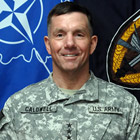"a soldier interacting, without mediation"


Restrictions
Kairos: How do you reconcile the desire to encourage and empower soldiers to "share their stories" based on personal experience and observations and the recommendation (CAC blog rules, 2009) to use interactive Internet activities to engage in "constructive, intellectual criticism and debate" with the restrictions on "derogatory information that could serve to embarrass [the command], the U.S. Army, or the U.S. government" (Caldwell, 2008c, p. 3)? What if someone's personal story does give a "fuller perspective" but doesn't have a positive effect? What considerations surround telling stories that may not be entirely "on message"?
Lt. Gen. Caldwell: We want soldiers to share their personal stories and have confidence in their judgment. It is 100% real and personal. It isn't messaged. That is the point. Soldiers who have the freedom to tell their story know the institution has confidence in their professionalism and competence as a US Soldier. We have an obligation, of course, to assist in the training and education of the soldiers to equip them with the skills to engage and then need to trust them to serve as ambassadors of their profession. We also know that the American public wants to hear those stories so that they can connect with those who serve their country. This is, of course, a different mindset that encourages transparency in all we do to inform and engage the very public we serve.
Kairos: On September 27, 2007, you described your experience as spokesman for MNF-I as you "began to realize that it was taking too long to declassify information" in order to "get pertinent information out to the media in a timely manner," and stated that you "learned that timeliness is important to maintaining the newsworthiness of a story" (Caldwell, 2007b). It sounds as if you were trying to give your information what scholars Jim Ridolfo and Dànielle Nicole DeVoss have called "rhetorical velocity," which they describe as "the strategic theorizing for how a text might be recomposed (and why it might be recomposed) by third parties" (Ridolfo & DeVoss, 2009), or in other words, making sure that the information you put out was sufficiently timely and accessible to make it easy for others to re-use in spreading your message. Sometimes, though, the Army has been criticized for too easily re-using and re-publishing information, as with the allegations of plagiarism directed at FM 3-24; and on the other hand, sometimes the Army seems to want to restrict any possible re-use of information, as with the widespread use of the "For Official Use Only" label on even the most apparently innocuous of texts. How do you see the Army responding to the intellectual property challenges and opportunities posed by the ease of reproducing information in the digital age?
Lt. Gen. Caldwell: I am with you on this, but I can only speak for myself and my command on this one. The military has security classifications for legitimate reasons, but one of my mandates in this new command is to try to never produce anything that requires classification. As a result, the highest classification we have on our documents is "For Official Use Only." To me, that means people outside the military can read the material for background information and understanding, but can't quote or use the material for publication. The driving consideration is to engage and inform in all that we do—and for our people to feel free to tell their personal story.
- Introduction
- Leadership
- Engagement
- Restrictions
- Operations
- Education
- Conclusion
- References